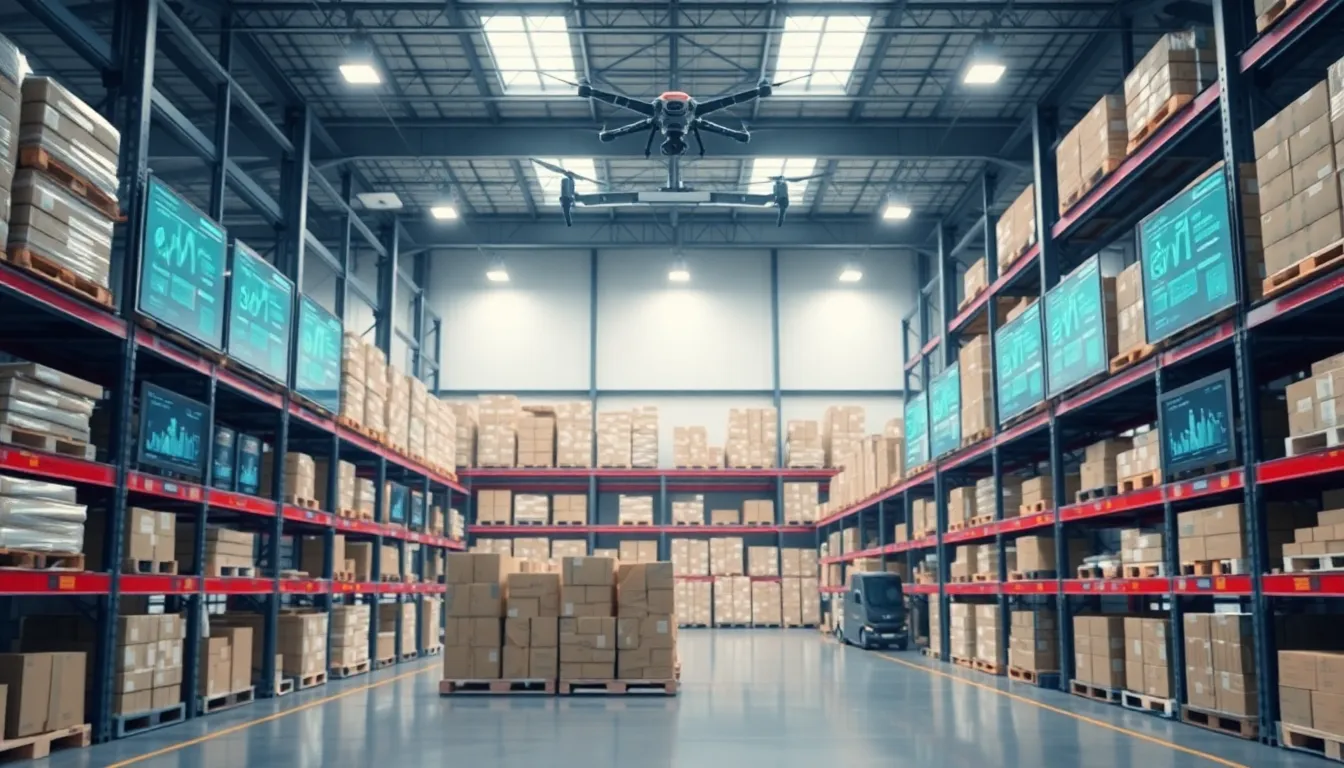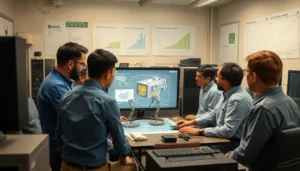Table of Contents
ToggleIn a world where supply chains are as tangled as a pair of earphones in a pocket, emerging technologies are stepping in like a superhero with a cape. From AI-driven analytics to blockchain transparency, these innovations promise to transform the way businesses operate. They’re not just buzzwords; they’re the secret sauce that can turn a chaotic supply chain into a well-oiled machine.
Overview Of Emerging Supply Chain Technologies
Emerging supply chain technologies revolutionize operations by enhancing efficiency and transparency. Technologies such as artificial intelligence (AI) optimize decision-making with data-driven insights. Enhanced analytics identify patterns in large datasets, allowing for precise forecasting and improved demand management.
Blockchain facilitates secure transactions and maintains a transparent record of product journeys. By ensuring data integrity, blockchain reduces fraud and enhances trust among supply chain participants. Additionally, Internet of Things (IoT) devices monitor real-time conditions of goods, allowing for proactive management of potential disruptions.
Drones and autonomous vehicles support rapid delivery and inventory management. These technologies reduce lead times and lower transportation costs by streamlining logistics. Furthermore, robotic process automation (RPA) boosts efficiency in repetitive tasks, freeing up employees for more strategic roles.
Augmented reality (AR) offers interactive training and improves warehouse operations. Employees can visualize complex workflows, enhancing productivity and minimizing errors. Collaborative platforms enable better communication and coordination among stakeholders, leading to enhanced collaboration.
Cybersecurity solutions protect sensitive supply chain data from breaches. As reliance on digital technologies grows, securing networks and information becomes critical for maintaining supply chain integrity. By integrating these advanced technologies, businesses position themselves for success and agility in a rapidly changing market.
Key Innovations In Supply Chain Management

Emerging technologies continue to reshape supply chain management, enhancing efficiency and driving new capabilities. Key innovations include artificial intelligence, blockchain technology, and the Internet of Things.
Artificial Intelligence And Machine Learning
Artificial intelligence and machine learning revolutionize supply chain management through data-driven insights. These technologies optimize decision-making processes, enabling precise demand forecasting and inventory management. Machine learning algorithms analyze historical data to identify trends, resulting in improved operational efficiency. Predictive analytics assists in mitigating risks by anticipating potential disruptions. Companies leveraging AI navigate complexities seamlessly, reducing costs and enhancing service levels. Real-time data integration from various sources further enriches the accuracy of insights, empowering businesses to respond swiftly to shifts in demand.
Blockchain Technology
Blockchain technology introduces levels of transparency and security previously unattainable in supply chains. Each transaction recorded on a blockchain creates an immutable ledger, minimizing fraud opportunities and ensuring accountability among participants. Supply chain stakeholders benefit from improved traceability of goods, fostering greater trust in product provenance. Smart contracts automate processes and facilitate faster transactions by executing automatically when conditions are met. With reduced delays and transparency, businesses streamline operations significantly, enhancing collaboration across the network. Adoption of blockchain leads to cost savings and strengthens relationships among partners through reliable communication.
Internet Of Things (IoT)
The Internet of Things (IoT) enhances real-time monitoring of assets and inventory throughout the supply chain. Connected devices provide valuable data, enabling proactive management of inventory levels and reducing stockouts. Sensors track the condition and location of products, resulting in enhanced visibility and responsiveness to disruptions. By analyzing data from IoT devices, companies make informed decisions to optimize operations. Integration of IoT solutions leads to increased efficiency from reduced manual checks and improved logistics coordination. As companies embrace IoT technology, they enhance overall agility and customer satisfaction.
Benefits Of Implementing New Technologies
Emerging supply chain technologies bring significant advantages. Companies that adopt these innovations experience transformative results.
Increased Efficiency And Productivity
Automation technologies eliminate repetitive tasks, allowing employees to focus on higher-value activities. Streamlined processes reduce time spent on manual work, leading to faster operations. Real-time data and analytics empower teams to make informed decisions quickly. Machine learning supports predictive analytics, enhancing demand forecasting accuracy. Businesses benefit from optimized inventory levels, minimizing waste and excess stock. Overall, the integration of AI and automation fosters a culture of continuous improvement.
Improved Transparency And Traceability
Blockchain technology establishes secure and transparent records across supply chains. Participants can track products from origin to destination, enhancing visibility at each step. This level of traceability builds trust among stakeholders and customers alike. IoT devices facilitate real-time monitoring of goods, providing detailed insights into their conditions during transit. Enhanced transparency reduces the risk of fraud and errors, making operations more reliable. Overall, adopting these technologies promotes accountability and strengthens partnerships.
Challenges In Adopting Emerging Technologies
Implementing emerging supply chain technologies presents several significant challenges for organizations. Companies often face hurdles that can impede the successful integration of these innovations.
High Implementation Costs
High implementation costs frequently deter businesses from adopting emerging technologies. Investing in advanced solutions like AI or blockchain requires substantial financial resources. Many organizations struggle with finding the budget for these expenses, especially when combined with the need to train staff and upgrade existing systems. Additionally, the return on investment may not be immediately evident, creating hesitation among decision-makers. For instance, initial costs for deploying IoT sensors and infrastructure can reach thousands of dollars, making the financial commitment daunting for smaller enterprises.
Resistance To Change
Resistance to change complicates the adoption of new technologies. Employees accustomed to traditional processes often feel uncertain about transitioning to innovative practices. Organizational culture plays a crucial role in this resistance; those who are not familiar with technological advancements may view them as threats rather than opportunities. To counteract this, leaders should foster a supportive environment and communicate the benefits of these technologies. Training programs that enhance understanding and skill development can ease this transition, helping staff embrace technological shifts.
Future Trends In Supply Chain Technologies
Emerging trends in supply chain technologies highlight the increasing need for efficiency and sustainability. Innovations shape the future, aiding businesses in navigating complexities while enhancing operational effectiveness.
Sustainability And Green Supply Chains
Sustainable practices define modern supply chains. Companies integrate eco-friendly materials and processes to reduce environmental impacts. Adoption of renewable energy sources exemplifies a commitment to sustainable operations. Furthermore, leveraging blockchain facilitates traceability, allowing consumers to verify the origins of products. Implementing circular economy principles encourages waste reduction and resource reuse. These strategies foster corporate social responsibility while meeting customer demand for greener options. Businesses prioritizing sustainability enhance their reputations and create long-term value.
Automation And Robotics
Automation and robotics revolutionize supply chain operations. Streamlining repetitive tasks through automated systems boosts efficiency significantly. Robotics plays a pivotal role in warehousing, improving inventory management and reducing human error. Implementing robotic process automation accelerates workflows, freeing employees for more strategic tasks. Autonomous vehicles enhance transportation efficiency through optimized routing and reduced delivery times. Data-driven insights from these technologies can predict maintenance needs, minimizing downtime. Companies adopting these innovations position themselves to enhance productivity and drive operational excellence.
Emerging supply chain technologies are reshaping the landscape of business operations. By leveraging AI blockchain IoT and automation companies can enhance efficiency and transparency while navigating complexities with ease. The shift towards sustainable practices further underscores the importance of these innovations in meeting modern consumer demands.
As organizations embrace these advancements they position themselves for success in an increasingly competitive market. While challenges such as implementation costs and resistance to change exist proactive leadership and employee training can facilitate a smooth transition. Ultimately the integration of these technologies not only streamlines processes but also fosters trust and collaboration among stakeholders paving the way for a more efficient and sustainable future.






